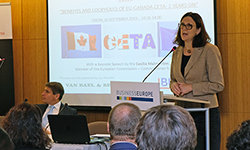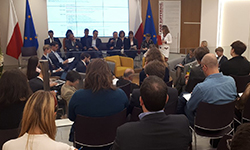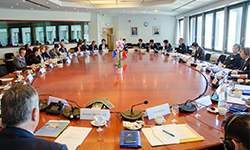BusinessEurope Headlines No. 2019-29
“EU leaders should increase Horizon budget to at least 120 billion Euros”

“EU leaders need to prioritise research and innovation in the next Multiannual Financial Framework. The budget for Horizon Europe will be a clear expression of the ambition”, stated BusinessEurope President Pierre Gattaz. He participated in the EU Research and Innovation Days on 26 September in Brussels, organised by the European Commission. The event gathered researchers, scientists, innovators and policy makers from all around Europe. Gattaz pointed out that for more than 30 years, the European research programmes have demonstrated their added-value in many fields, from climate to health projects. “Let’s be very ambitious and increase the Horizon Europe budget to at least €120 billion”, he said.
Contact: Carolina Vigo
Video message
Why Horizon Europe budget should be increased – the university point of view
KU Leuven Rector Luc Sels is convinced that Horizon Europe is key to build a stronger future, to develop excellence and to build more solid ties between academia, research organisations and business. See why.
Our comment
EU-Canada agreement CETA is two years old!
By Luisa Santos, Director for International Relations
 On 21 September 2017 CETA - the trade and investment agreement between Canada and the EU - came into provisional application. Although ratification of the agreement is still ongoing at national level, companies and citizens in Canada and the EU can already benefit from all the trade and investment opportunities created by CETA.
On 21 September 2017 CETA - the trade and investment agreement between Canada and the EU - came into provisional application. Although ratification of the agreement is still ongoing at national level, companies and citizens in Canada and the EU can already benefit from all the trade and investment opportunities created by CETA.
Even if two years is still a short period of time, we can already take stock of the main achievements of CETA and which areas need improvement. The benefits and loopholes of the agreement were discussed during a BusinessEurope event on 20 September, which had the participation of Trade Commissioner Cecilia Malmström.
Agreements only exist if they are used and if the opportunities they create become real. Otherwise, they are not more than good intentions.
The numbers seem to indicate that the agreement is being used and companies and citizens are benefiting from CETA in different areas. As an example, in 2018 the EU’s merchandise exports to Canada increased by 15% to reach € 5,3 billion compared to the average exports of the previous 3 years.
European companies are also winning public tenders in Canada. When negotiations started, not many thought it would be possible to open the public procurement market in Canada, which is mainly a competence of Canadian Provinces. In the end, Canadian Provinces came to the negotiation table and the results are now visible with increased opportunities for European economic operators.
CETA is in many ways a landmark agreement. It was the first agreement concluded with a developed economy that shares the same values as the EU, a close partner that believes in multilateralism and rules-based trade and is committed to a progressive trade agenda. CETA aims primarily at reducing barriers and eliminating duties but it can also help addressing climate change and promote high social and environmental standards through its sustainability chapter.
CETA is also a very important agreement because it was at the origin of important changes in the EU’s trade policy. We all remember how difficult it was to adopt this agreement, which is considered to be of mixed competence and therefore subject to ratification by national parliaments. CETA led to the separation of mandates for trade and investment. This approach should make the ratification process easier for the trade part but we need to ensure that the investment part is not undermined in the process
But CETA is still a child and it needs to grow up and become a mature adult.
For example, CETA offers a framework for regulatory cooperation but we need to bring this forward and look for concrete avenues of cooperation both in traditional and new sectors. Businesses on both sides are extremely interested in this exercise.
We are just at the beginning of what we hope will be a long-lasting cooperation between Canada and the EU to develop common approaches to shared challenges like the reform of the World Trade Organisation (WTO), climate change or the digital economy, just to name a few.
Contact: Luisa Santos
An ambitious EU industrial strategy
 “Europe needs to become more pro-active and strategic than in the past. We need an industrial strategy that combines enabling conditions for the benefit of industry as a whole, with deeper work on strategic value chains where public authorities will need to support and co-invest more intensively with the private sector”, said BusinessEurope Director General, Markus J. Beyrer at a meeting with MEP Adina-Ioana Vălean, new chair of the Industry, Research and Energy Committee of the European Parliament. Beyrer stated that megatrends such as climate change, with Europe’s ambition to be climate neutral should go hand-in-hand with a revived industrial strategy that fosters investments in the upscaling and deployment of low-carbon technologies and preserves industrial competitiveness. “A strong budget for the ‘Horizon Europe’ programme is essential to develop the new technologies and solutions that will bring Europe towards climate neutrality”, he said.
“Europe needs to become more pro-active and strategic than in the past. We need an industrial strategy that combines enabling conditions for the benefit of industry as a whole, with deeper work on strategic value chains where public authorities will need to support and co-invest more intensively with the private sector”, said BusinessEurope Director General, Markus J. Beyrer at a meeting with MEP Adina-Ioana Vălean, new chair of the Industry, Research and Energy Committee of the European Parliament. Beyrer stated that megatrends such as climate change, with Europe’s ambition to be climate neutral should go hand-in-hand with a revived industrial strategy that fosters investments in the upscaling and deployment of low-carbon technologies and preserves industrial competitiveness. “A strong budget for the ‘Horizon Europe’ programme is essential to develop the new technologies and solutions that will bring Europe towards climate neutrality”, he said.
Contact: Alexandre Affre
Innovation principle: why it should be fully used
 “Well-drafted policies can be a driver of innovation, poorly-designed rules can stifle it”, said Dr Norbert Lütke-Entrup, Chair of the BusinessEurope Working Group for Research and Innovation, intervening at the European Research and Innovation Days on 24 September in Brussels. The innovation principle, he added, encourages law makers to assess the impacts that future legislation may have on innovation. “This is why we need to fully implement the principle across the whole policy portfolio and from evaluation to implementation of new legislation”, Norbert concluded.
“Well-drafted policies can be a driver of innovation, poorly-designed rules can stifle it”, said Dr Norbert Lütke-Entrup, Chair of the BusinessEurope Working Group for Research and Innovation, intervening at the European Research and Innovation Days on 24 September in Brussels. The innovation principle, he added, encourages law makers to assess the impacts that future legislation may have on innovation. “This is why we need to fully implement the principle across the whole policy portfolio and from evaluation to implementation of new legislation”, Norbert concluded.
Contact: Carolina Vigo
Member States discuss Single Market barriers
 Officials from Permanent Representations and Member State representatives who are also participating at the EU Competitiveness Council meeting on 26-27 September exchanged their experiences in addressing barriers to trade in the Single Market at national level. They met at an event hosted by the Permanent Representation of Poland to the EU on 25 September and exchanged numerous examples of successfully resolved but small in scale SOLVIT cases (complaints by businesses). They also attempted to define what constitutes a barrier so that a common understanding among Member States is achieved. BusinessEurope Director for Internal Market, Martynas Barysas, shared BusinessEurope’s assessment of barriers, highlighting five main categories, such as regulatory disparities, implementation issues, administrative barriers, uneven enforcement and lack of physical infrastructures. He shared a number of illustrative examples based on membership’s various inputs to date. For instance, on the market fragmentation effects of consumer protection legislation, Single Market loopholes in the privacy framework with uneven GDPR application and a badly designed E-Privacy proposal, inconsistencies in chemicals legislation, Commission’s bureaucratised approach to standardisation affecting access to the market, and lack of transparency on regulatory activities in general to name a few. In the discussion on solutions, the updated BusinessEurope’s strategy paper on Single Market priorities beyond 2019 was presented. It was also highlighted that the Competitiveness Council and Member States should not get lost in small and narrow details, even if they need to be addressed, but should get the policy and law principles right. “First, the focus should be on better implementation and enforcement of rules we have today and professionalisation of public administrations. Second, return to basics, that is the principles-based Single Market legislation – if necessary - instead of being overly prescriptive”, Barysas stated. He also stressed openness of the business community to provide further input on concrete barriers.
Officials from Permanent Representations and Member State representatives who are also participating at the EU Competitiveness Council meeting on 26-27 September exchanged their experiences in addressing barriers to trade in the Single Market at national level. They met at an event hosted by the Permanent Representation of Poland to the EU on 25 September and exchanged numerous examples of successfully resolved but small in scale SOLVIT cases (complaints by businesses). They also attempted to define what constitutes a barrier so that a common understanding among Member States is achieved. BusinessEurope Director for Internal Market, Martynas Barysas, shared BusinessEurope’s assessment of barriers, highlighting five main categories, such as regulatory disparities, implementation issues, administrative barriers, uneven enforcement and lack of physical infrastructures. He shared a number of illustrative examples based on membership’s various inputs to date. For instance, on the market fragmentation effects of consumer protection legislation, Single Market loopholes in the privacy framework with uneven GDPR application and a badly designed E-Privacy proposal, inconsistencies in chemicals legislation, Commission’s bureaucratised approach to standardisation affecting access to the market, and lack of transparency on regulatory activities in general to name a few. In the discussion on solutions, the updated BusinessEurope’s strategy paper on Single Market priorities beyond 2019 was presented. It was also highlighted that the Competitiveness Council and Member States should not get lost in small and narrow details, even if they need to be addressed, but should get the policy and law principles right. “First, the focus should be on better implementation and enforcement of rules we have today and professionalisation of public administrations. Second, return to basics, that is the principles-based Single Market legislation – if necessary - instead of being overly prescriptive”, Barysas stated. He also stressed openness of the business community to provide further input on concrete barriers.
![]()
![]() Contact: Martynas Barysas
Contact: Martynas Barysas
Future of European Company Law
 The recently adopted company law package has represented a major breakthrough when it comes to harmonisation of procedures for cross border operations as well as granting access to e-government tools for incorporation and other important company acts. Correct implementation avoiding gold plating will be fundamental to secure the added value of the new rules. The increasing use of technologies offers simultaneously possibilities but also challenges. As with other fields of EU law, we need to check whether company law is fit to deal with emerging technologies. These messages were voiced by BusinessEurope in the 13th symposium of the European Company and Financial Law Review (ECFR) in Krakow, Poland, on 27 September.
The recently adopted company law package has represented a major breakthrough when it comes to harmonisation of procedures for cross border operations as well as granting access to e-government tools for incorporation and other important company acts. Correct implementation avoiding gold plating will be fundamental to secure the added value of the new rules. The increasing use of technologies offers simultaneously possibilities but also challenges. As with other fields of EU law, we need to check whether company law is fit to deal with emerging technologies. These messages were voiced by BusinessEurope in the 13th symposium of the European Company and Financial Law Review (ECFR) in Krakow, Poland, on 27 September.
Contact: Pedro Oliveira
Concern over industrial policy developments in China
 “Although China has made remarkable strides over the past 40 years in opening up its economy and facilitating the entry of European companies in the Chinese economy, the European business community is concerned about the direction of developments in recent years”, Maurice Fermont, Trade Policy Adviser at BusinessEurope, told policy makers at the 9th DG GROW-MIIT Industrial Policy Dialogue on 20 September, in Brussels. The European business community flagged four major policy developments that give cause for concern, namely the strengthening of state-owned enterprises at the expense of the private sector, the semi-official market share targets and indigenous innovation requirements of the Made in China 2025 plan, the transparency, compliance and corporate data integrity concerns surrounding China’s social credit system, and ongoing level-playing field issues as a result of industrial subsidies and overcapacity. “We want to achieve a level playing field and we want the EU and China to focus on results-based cooperation, with clear objectives and deadlines, as the best way to achieve this”, Fermont concluded.
“Although China has made remarkable strides over the past 40 years in opening up its economy and facilitating the entry of European companies in the Chinese economy, the European business community is concerned about the direction of developments in recent years”, Maurice Fermont, Trade Policy Adviser at BusinessEurope, told policy makers at the 9th DG GROW-MIIT Industrial Policy Dialogue on 20 September, in Brussels. The European business community flagged four major policy developments that give cause for concern, namely the strengthening of state-owned enterprises at the expense of the private sector, the semi-official market share targets and indigenous innovation requirements of the Made in China 2025 plan, the transparency, compliance and corporate data integrity concerns surrounding China’s social credit system, and ongoing level-playing field issues as a result of industrial subsidies and overcapacity. “We want to achieve a level playing field and we want the EU and China to focus on results-based cooperation, with clear objectives and deadlines, as the best way to achieve this”, Fermont concluded.
Contact: Maurice Fermont
Calendar
- 29 September: Austrian elections
- 30 September: Trade for Her: Empowering Women through International Trade
- 2 October: BusinessEurope event "Reaching climate neutrality: Framework conditions and actions on how to get there"
- 4 October: Environment Council
- 6 October: Portugal elections
Reminder: please have a look at our privacy policy